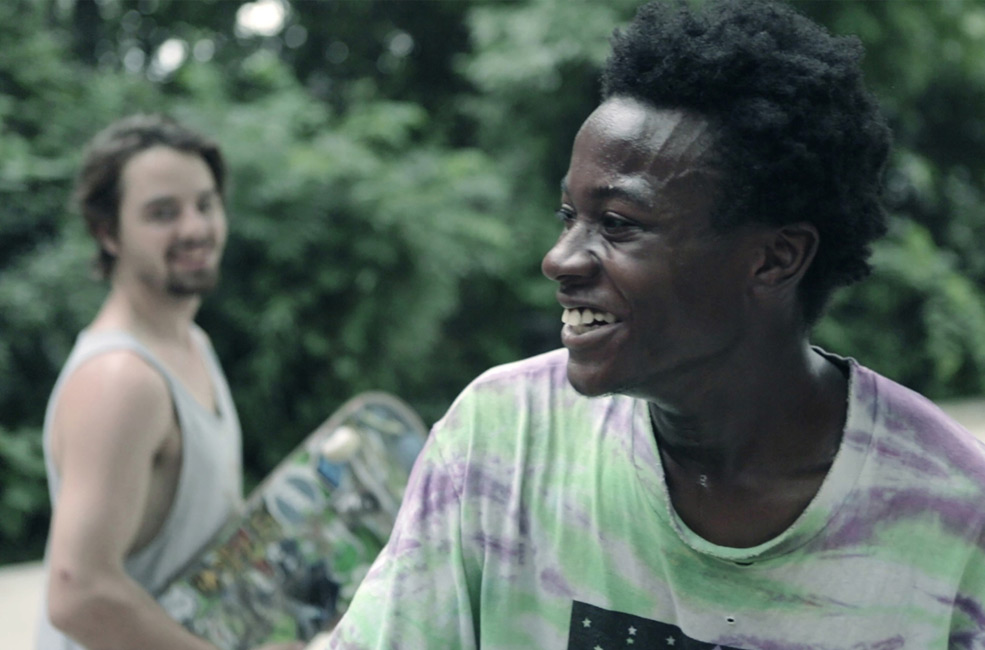About halfway through “Minding the Gap,” you get a glimpse of the kind of film it could’ve been when director Bing Liu sits down with his mother Mengyue. Surrounding her with all the traditional documentary equipment – light stands, a boom mic, and a nondescript background against which she can give testimony without distraction – Liu gingerly asks Mengyue questions about his stepfather Dennis, who terrorized them both with his abusive behavior. Naturally, it’s impossible to deny that Mengyue’s words have power, but they’re muted to some degree by the format that you’ve seen in a million other documentaries, as well as the fact that she’s obviously reticent about discussing past trauma. However, it is the placement of this scene smack in the middle of “Minding the Gap” that gives it import, coming well after you know what Liu has made isn’t typical by any means and confirming what you suspect – that this is personal storytelling writ large in channeling his own experience through a larger narrative that begins by following two friends of his — Zack and Keire — home from a skate park in Rockford, Illinois.
At first, “Minding the Gap” may seem like any other coming-of-age tale, opening with the teenagers scaling a building by climbing up the pipes on its side in order to skate on the roof. The exuberance radiating off the boys is infectious, but also amplified by Liu’s crafty camerawork, zooming in and out with an oscilloscope lens with a great sense of discovery. The film settles down, but the kids remain restless, with both Zack and Keire disconnected from their families for reasons that gradually reveal themselves — Zack actually picked up his love of skating from his father, who used to own a skate park, but for all intents and purposes left the nest at 16, living with his girlfriend Nina, with whom he’s about to have a child, and Keire remains at home with his mother Roberta, yet largely sticks to his own room, once going with his father in his parents’ divorce but retreating to his mom’s place when his dad’s discipline became a bit too much. (“Well, they call it child abuse now,” says a deadpan Keire when pressed.)
Both consider their real families to be their fellow skaters, which explains how Liu, who bought a camera off of eBay to go the Spike Jonze route following a skating accident in which he broke his arm, got such intimate access to the two young men, filming their lives over the course of a formative five years. But it’s how Liu places their stories into a larger context that makes “Minding the Gap” so extraordinary, seizing on Zack’s burgeoning fatherhood to examine how his behavior was shaped by his own father and what he may pass onto his own son and Keire’s recollections of his father, following his death, to realize that there were elements of his tough love that he’s come to appreciate. It doesn’t go without mention that these stories play out in Rockford, a city notorious for its prevalent high crime rate fueled by domestic abuse cases, but Liu wisely resists putting too fine a point on it, also limiting how much he leans on his own experience as a way into the story, to make the film feel universal while specifically pinpointing all of the personal, social and cultural forces at work in creating a generational cycle of behavior for families that becomes difficult to break.
What Liu and editor Joshua Altman construct is one of the finest pieces of editing you’re likely to see, though then again you’d never take notice of it until after “Minding the Gap” is over. Without ever specifying the progression of time, you slowly start to see how the beer Zack always seems to be clutching onto turns from an expression of youthful rebellion into an admission of defeat and despair as he struggles with the pressures of becoming a father barely out of his teens and his deteriorating relationship with Nina. (Liu’s sensitivity towards portraying both sides of the couple is noteworthy, clearly providing Nina the comfort to talk about how her own family life played a part in why she sticks with Zack.) As quietly devastating as it is to see Zack refuse to grow up, clinging onto all he knows from youth, it is invigorating to watch Keire start to coming into his own, developing his opinions apart from friends and family as he embraces the responsibility of a dishwashing job at a local restaurant with the hope of saving enough money to get out.
Unspoken throughout the film is the lack of opportunity in the area to transcend the circumstances one is born into, but it lingers all around, making the skating footage (all shot by Liu) where the young men can feel as if they can fly particularly magnificent, and the appreciation of the moments when Zack and Keire can break through in their day-to-day lives or even just mentally even more beautiful. It seems impossible for “Minding the Gap” to be as inspiring as it is, given its difficult subject matter, but just the fact that someone with Liu’s background could make it fills one with hope and that he is able to articulate such an amorphous issues as domestic abuse and generational transference with such emotional precision makes for a truly moving experience.
“Minding the Gap” will premiere on August 17th on Hulu and in theaters.




